

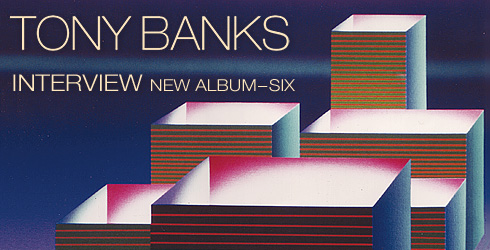
it: Before we really start I have to mention that I haven't heard all the music on the new album yet. Your management sent us a CD with one minute of each track, so unfortunately I cannot go into much detail with the music.
TB: It's not coming out for half a month or so, that's probably why.
it: The Turn It On Again tour ended in October 2007, while the recording for the new album began in March 2011. Did you spend the entire time working on Six?
TB: Well, not all, I suppose. I didn't really have anything written at the end of the tour, but I had it in the back of my mind that I wanted to do another orchestral piece, so I started working, not straightaway, though. I must have been working steadily on it through – it must have been summer 2009, and most of the stuff came during that period, really. After that it was a question of how I was going to do it, who I was going to use to help me. It's obviously been a year since I actually finished the record. It's been finding record companies, sorting out everything, as it happens. It always takes longer than it should, really. I'd rather have everything happen rather fast.
it: The booklet mentions that Six is slightly different from Seven. What are the main differences?
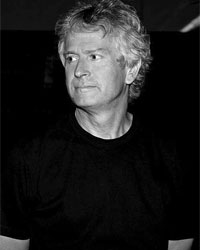 TB: The obvious difference is that
there are six pieces instead of seven. That's a difference [laughs].
The most obvious thing is that two of the pieces are kind of led by a
solo instrument, one led by an alto saxophone and the other led by a
violin. From the back of my mind I was trying to do it a little bit
more like that, which is slightly more like the solos I used to do
with Genesis in, say, The Cinema Show or Apocalypse in 9/8 in that
one instrument would lead and the background was slightly less
important, as it were. I had one piece that always felt like it would
be quite good led by an instrument like something like a saxophone,
and that was there all along. The other piece, which is violin-led,
was more like a kind of background for something, I didn't quite know
what. It could have been quite anything, really, it was sort of a
fast piano piece, but then I thought if it had a nice doodling on top
of it, this could work really well as a kind of solo for something
that is going quite fast. And the obvious instrument for playing fast
is, in the classical world, I think, is the violin, which is
expressive in the way a guitar is. So that's what I decided to do,
really. Once I started to do a few bits and pieces it came very
easily.
TB: The obvious difference is that
there are six pieces instead of seven. That's a difference [laughs].
The most obvious thing is that two of the pieces are kind of led by a
solo instrument, one led by an alto saxophone and the other led by a
violin. From the back of my mind I was trying to do it a little bit
more like that, which is slightly more like the solos I used to do
with Genesis in, say, The Cinema Show or Apocalypse in 9/8 in that
one instrument would lead and the background was slightly less
important, as it were. I had one piece that always felt like it would
be quite good led by an instrument like something like a saxophone,
and that was there all along. The other piece, which is violin-led,
was more like a kind of background for something, I didn't quite know
what. It could have been quite anything, really, it was sort of a
fast piano piece, but then I thought if it had a nice doodling on top
of it, this could work really well as a kind of solo for something
that is going quite fast. And the obvious instrument for playing fast
is, in the classical world, I think, is the violin, which is
expressive in the way a guitar is. So that's what I decided to do,
really. Once I started to do a few bits and pieces it came very
easily.
it: What else is there to know about the album?
TB: I still worked with an arranger again, a different one this time. I think some of the pieces are a bit further produced this time prior to getting that stage. Another difference is that the titles do ... ahm, I'm not very good with titles for classical, orchestral pieces because to me they're just music, really. But they did form into a kind of very natural idea of a simple story, with the two solo pieces being sort the main hero and heroine, if you like, of the story and the other pieces suggesting parts of the story, with the final piece being the most dramatic one which is also the destination, the reason for the story. I think it works quite well as that. But it is not really something that you're supposed to think about.
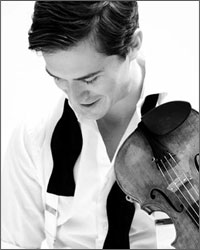 it: Why did you choose the City Of
Prague Philharmonic Orchestra?
it: Why did you choose the City Of
Prague Philharmonic Orchestra?
TB: Well, I would have tried it in England, at least with the London Philharmonic Orchestra – I just find it is prohibitively expensive, really, to get any kind of rehearsal time with the orchestra when you do it over here. And a lot of people suggested that doing it in Prague was good work doing it, with in particular with a group of musicians who are put together by a chap out there for all the orchestras in, in … well in all the Czech Republic, really. And you'd be getting a little bit who is available and have certain core people who are available all the time. And I must look at expenses so I said I'll try that 'cos I imagine I would get much more time with them and rehearsal time and everything for considerably less money than it would cost me over here. You know, these things, putting an orchestra together and making a recording takes a lot of time and money and you're not getting it back 'cause it is not really going to sell to justify it. It's just one of those things. So I just thought „Keep everything in track“. As it turned out, I actually had more time with these guys than I needed. They're real quick, very good, used to working perhaps with someone more like me, and rehearsal time... We really did have just one day rehearsal, but it made all the difference really in terms of – particularly in terms of correcting the scores, so you can get rid of all the obvious errors and also make any adjustments we felt were necessary to the most obvious things that occurred to us in terms of the arrangement, so we would hear it back and get a real idea, tempos and everyone would feel... When it came to actually recording it for real we were sort of halfway there already. Some, in particular the slower pieces, came really quickly.
it: Will there be any live performances of your music by an orchestra?
TB: Well, that's something I'd like to do. There is no plan at the moment, but it's something we've talked about. It could well happen, I think. It would be nice to do. Particularly this one. Seven as well, I sort of decided to do that, although I would want to rework some of that, as it happens. It's certainly something that various people talked to me about and it's something that might happen, but I always feel a little bit „wait and see“ how the record is reviewed, how it goes down towards people. We will see where we go from there.
it: Peter Gabriel very successfully recorded some of his music in orchestral arrangements, toured with these. Ray Wilson's is doing this Genesis Classic programme with orchestra...
TB (not understanding the question acoustically): Sorry, who's the last person?
it: Ray Wilson.
TB: Oh, right. I didn't know that.
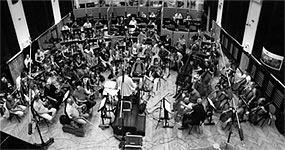 it: He's been doing it for quite a
while now, playing Genesis songs with orchestra. Can you image doing
something similar with Genesis music, maybe with Mike and Phil?
it: He's been doing it for quite a
while now, playing Genesis songs with orchestra. Can you image doing
something similar with Genesis music, maybe with Mike and Phil?
TB: It interests me a lot less, really. How Pete did it was kind of like orchestra arrangements for the pieces, but in those terms it was attempting to be classical style of orchestral music. The arrangements in the main were really simple. I haven't heard what Ray did. I didn't really like what, um, the guy did... the Genesis symphony thing... Tolga Kashif. I didn't feel it really did justice to the pieces, you know. I think if you gotta do it it could be done. The songs to be done there would be kind of much more involved. I would want to sort of write to the heart of anybody and do something significant. I don't know. It is old music. Whether I'd want to do that or no I don't know. Some pieces would lend themselves to it. I mean, one of the pieces that Tolga did was Mad Man Moon, but he only used about a minute of the song, the rest was all kind of his own stuff. I didn't think that was very good. The minute of the song sounded good. It's a perfect piece, I think, to do an orchestral adaptation of. I was quite excited when I saw he'd done a twelve-minute version of it. I thought that could be great! [laughs] And I was very disappointed, I have to say. There are obviously songs like Firth Of Fifth that lend themselves to orchestral performance, and other bits and pieces, but I don't know. I don't know if I've really got the sort of … It takes lot of time, energy and everything to do this, and I feel that this is music that … worked very well in one medium. It's been done. If someone else wants do it, well, that's fine. In all honesty, I didn't feel that, with what I heard from Pete and stuff, it added really anything to the original. A song like San Jacinto has a bottom end that is created by the instruments he used originally is so fantastic – you can't really create that with an orchestra and stuff. It's a different thing. It's a different take on it. Some people like it, some people don't. I didn't see it live, and I'm told that it was very, very good live, and I'd like to have seen it live, but I didn't get round to do it. It's not something I care about quite so much. The marriage between rock and pop and classical music has a fairly checkered history, I think. I can't think of any examples where it's been particularly effective.
it: What do you think: Was the Turn It On Again tour the final activity of Genesis or may there be another tour, another album even?
TB: Well, you must have asked this question of pretty much everybody, I suppose, [laughs] and the answer is pretty much no. It's more about Phil than anyone else out of Mike, Phil and I who sort of feels that he's done it for the last time. He has a few physical problems with his arm and so that idea of playing a ten-minute drum solo doesn't seem to be quite so appealing. I think Mike and I are could be possibly convincible, but... it's not. I don't think it's ever gonna happen now and I don't think and I can't see anything else from the record-recording point either. I think everyone's sort of gone a bit in their own directions now. But you know, I never rule it out. Who knows? I see Mike quite a lot and anything could happen in that direction, but I don't see anything at all in the Phil way.
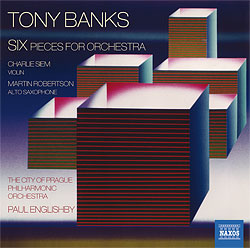 it: What are your personal plans for
the future?
it: What are your personal plans for
the future?
TB: Well, obviously I've got this project which will see me through the next two or three months now, really. A lot of it depends on how this is received. I've done a lot of solo albums in my career as you will know with, I suppose, in all honesty, pretty little success, and you've got pick yourself off the floor each time to get yourself motivated to do it again. I just don't know, really. I'd love to do this again, I think, but I don't want to go on banging my head against the wall the whole time. Because everytime you put things out you go through all this series of anticipation and you want the thing to do well and then the disappointment is always quite a thing really. I don't see the point, particulary, in doing that. I've made a lot of music during the years that -I- 've been very pleased with. A Curious Feeling, when I first did that I thought that's some of the best music I've ever written, including with Genesis and so. It did okay, but not terrifically well. And I tried to revert back to it again a couple of years ago but that didn't really work. I mean, it's out there, if people wanna hear it they're welcome to it. [laughs] To do more – I just don't know. It depends a bit on how I feel. I'm sort of approaching genuine retiring age, and there are a lot of things I'd like to do. I love playing music but the whole circus of recording and stuff and certainly the circus of having to then afterwards promote it … I love writing and I love making music. The rest of it I can live without. And if it doesn't produce a great result you slightly lose interest.
it: So how about a Best Of Tony Banks Solo album to get people interested in your music?
TB: Yeah, it sounds promotable. The thing is what I'll do, what we're talking about, we're gonna get my website working properly again and we might make all the albums available there. I thought of doing a kind of best of, but in a way it's a slightly difficult thing to do. You're gonna promote it to people who're probably gonna know it anyhow. I thought about it because I thought it would be quite nice to have a sampler album of all that I think are the best things. It's something that I might do. It's possible. It's kind of difficult to know where A Curious Feeling fits in with that because I really don't like to take bits and pieces out of that context of that album. I feel it works as a total. So you have to think do you do this album or all the other stuff? I don't know. I have thought about it but I can't quite see what the point of it is apart from the fact that it means I have a kind of nice ordered way of saying, 'well, these are the things I think you should listen to'. But you can't promote anything these days in order to get radio play or anything, so it's … I'm slightly … I don't know.
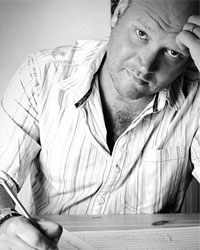 it: What about a CD release of The
Wicked Lady?
it: What about a CD release of The
Wicked Lady?
TB: We'll definitely do that if we do all – the idea is to put out all the records so we will probably do that one as well at the same time because it should be out there. It has nice things on it. It is a curious mixture of things, really, because the original record, one side had sort of demos that I did for the original pieces and on the other side were obviously the orchestral versions, including one slightly embarrassing version with drums and bangs all over the main theme which I would be very tempted to leave off. But I suppose I will get stick if I do that. But I think the main... the whole suite is the kind of the thing, it's an example side of how I'm writing at home. What I really do, putting together with a piano and a few bits and pieces to try and get some idea of how it might all sound.
All in all, Wicked Lady was a fine experience when I did it. I was just very rushed at the time I did it because I was doing The Fugitive at the same time and probably put more effort into that. And I relied quite a lot on the arranger, Christopher Palmer, when he came to it, and to be honest, for one or two of the pieces in the orchestral version he actually wrote some thematic pieces as well in that so it's not quite so hundred percent me as everything else I've done.
it: Let me say then „good luck and all the best for your new album“...
TB: I hope you enjoy the record when you can hear it properly. I'm very pleased with it. The reaction so far has been very good but then before it comes out it often is, so I hope you enjoy it.
it: Thank you for the interview.
TB: Thank you.
The new album SIX: Pieces For Orchestra is available for preorder at amazon-uk